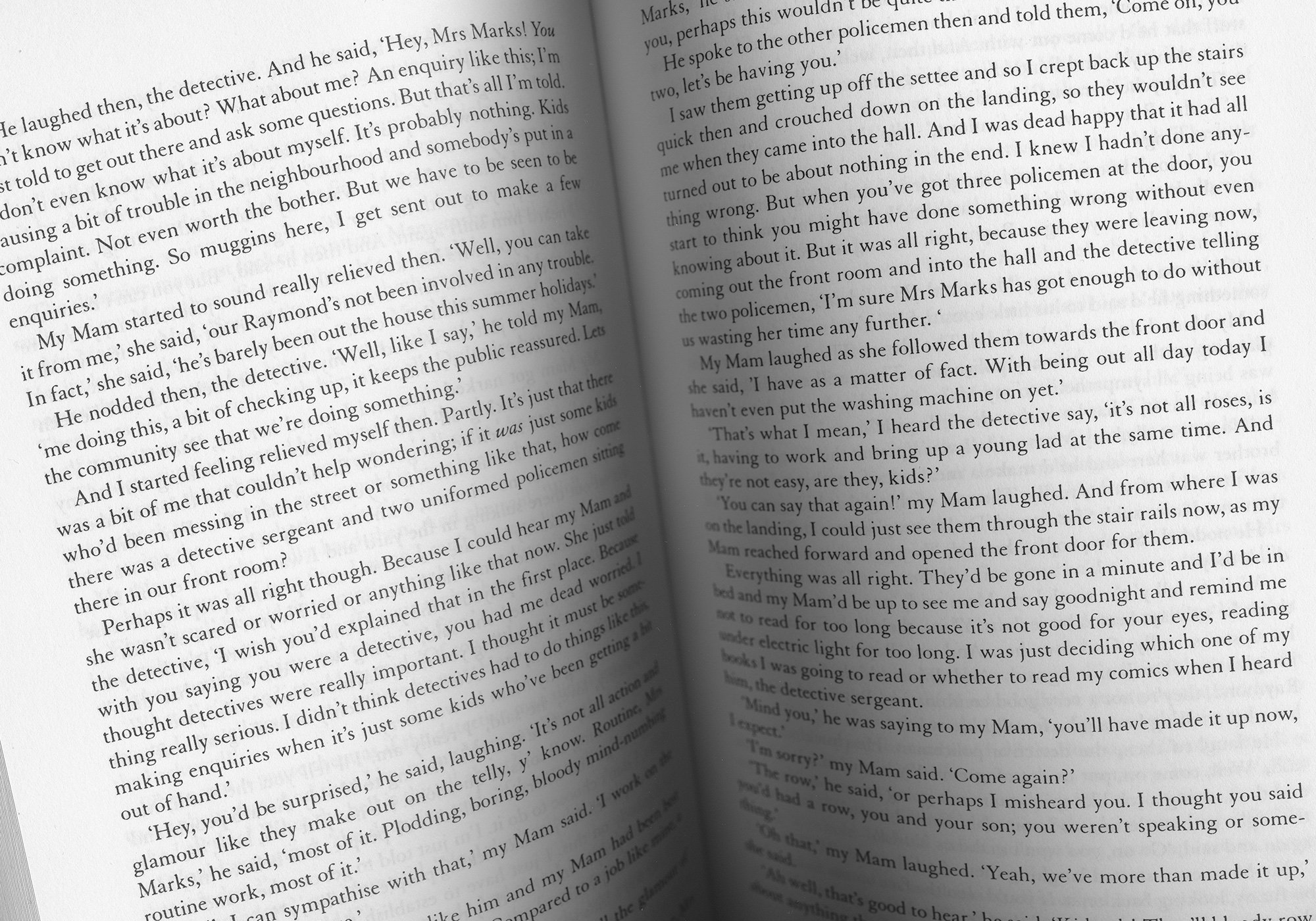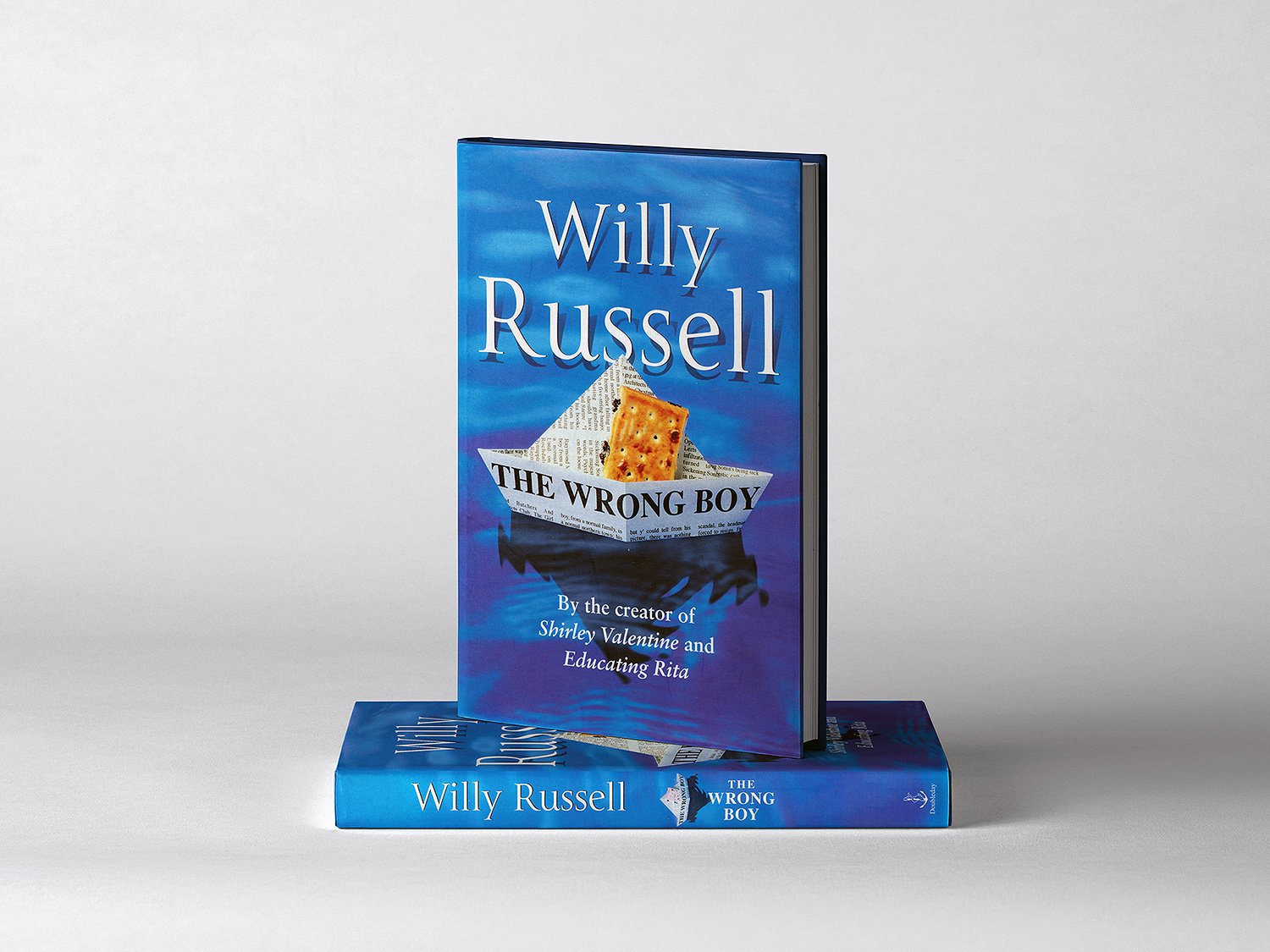
The Wrong Boy

Willy Russell’s debut novel The Wrong Boy was published in 2000 in the UK and since then has been published worldwide. The Wrong Boy which is written in episodic form tells the story of Raymond Marks a boy from a northern town and how on the banks of the Rochdale canal, one single incident changes Raymond’s life forever.
In his first novel, Willy Russell has created a character to stand alongside his celebrated progeny, Shirley Valentine and Rita, and has eased the transition from stage writing to prose fiction by presenting his story through a series of letters which could cheerfully work as dramatic monologues.
Stephanie Merritt The Guardian
“The idea for a novel was for me a bit of a challenge… I wrote the first few pages for a bit of fun and realised that I had accidentally created a character… With The Wrong Boy, I wanted to give an intensely intimate portrait of someone who has their faith in life and innocence removed from them through the fallout from one incident.
I'd certainly like to see The Wrong Boy translated to the small screen but it's not something that I need to see. What I absolutely needed to do was to write the book and so, regardless of whatever happens screen wise, my primary aim and ambition with this has been fulfilled. One of the things I most enjoy is bringing Raymond to an audience through giving readings from the book.
Willy Russell
Unusual, funny, unsettling and rich with sadness.
The Times
A warm, funny, poignant story. I loved the wrong boy - and so will you.
Sunday Telegraph
Big-hearted, wonderfully funny and engrossing
The Mirror
This haunting debut is a wry tale of accusations and blame, scandals and scapegoats, and the demonisation of an innocent child by a society steeped in self-righteous hypocrisy. Russell delights in his skilful depiction of a child's-eye view. He makes crafty use of literary devices to externalise his protagonists's inner thoughts. The identity of the Girl with the Chestnut Eyes, revealed in the denouement, is too precious to give away, but it leaves you in no doubt that the Wrong Boy is an indictment of an adult world in which misfits and children are stigmatised.
Sarah Willcocks - The Literary Review
A first novel from the man who created Shirley Valentine and Educating Rita (not to mention the phenomenally long-running West End hit Blood Brothers) has to be an event.
That Willy Russell has chosen the notoriously difficult epistolary form for his fiction debut seems strange at first, until you think of the letter-chapters as on-stage addresses by the narrator.
Once you 'hear' them as soliloquies, everything falls into place. Beautifully.
Russell's hapless teenage anti-hero, Raymond Marks, writes a series of long letters to his own hero, the cult musician Morrissey, in which he recounts the bizarre, hilarious and terrible story of his life. Raymond grows up in an ordinary Northern town, Failsworth, within an ordinary dysfunctional family, and life might have gone on being boringly normal if it were not for a dirty little fly-trapping game Raymond and his school friends devise on the banks of the canal.
Then Raymond is plunged into the murky waters of apparent abnormality, and swiftly identifies himself as 'the wrong boy' of the title. It's a desperate, poignant metaphor for all those who fail to fit in, and fail and fail again - although their worth may be considerable.
Yes, surely 'Failsworth' is as deliberate as Russell's deceptively light style.
There are sustained set-pieces of such rollicking farce that sometimes it is hard to hold the hefty novel for laughing. Yet if I hail this as a comic masterpiece in the tradition of Sterne's Tristram Shandy - full of diversions in which you meet a set of characters who only occasionally verge on caricature - it is only in the knowledge that the flip side of the truest comedy is always sad.
Raymond Mark's life is full of ordinary tragedies and extraordinary injustices. But Willy Russell's triumph is to have created an unforgettable character, both unique and an Everyman, who suffers (most entertainingly) but is allowed to travel surely towards his own redemption - and so holds out that precious hope that 'everything's gonna be all right' for the rest of us.
Bel Mooney Mail on Sunday
There was a time, a full generation ago, when Willy Russell mingled anonymously with Liverpool theatregoers. But literary sainthood has a price and does away with privacy.
Last night's capacity audience to hear the Blood Brothers creator read from his first novel included at least one high court judge.
Hero of the new tome, The Wrong Boy, is a 19-year old from suburban Manchester, writing an epistle of faith, hope and some considerable charity to his hero, the singer Morrissey.
The literary result is Adrian Mole with attitude.
The singular narrative removes the need for inter-character explanations. So the words read like a great dramatic monologue, allowing Willy Russell, instinctive playwright, to still shine through. To this, is added various naturally suggestive tempos, as a musical composer may do.
For instance, slow when making a sentimental point, fast when indulging in a litany of complaint of an outburst of joy. What truly made the event is that Willy is a great performer, as well as a delicious writer with still quite political insight.
Like Alan Bennett, he can bring his own texts to life.
He once stood in for John Conteh as narrator in his early Beatles musical John, Paul, George, Ringo and Bert. Then he astounded us by replacing the indisposed Noreen Kershaw in the premiere run of Shirley Valentine.
Nowadays - still with the recognisable helmet of hair, silvered into distinction - he looks positively professional.
The frock-coated suit even hearkens back to Dickens (who also expertly read his own material). Willy's manner was friendly, but still schoolmasterly: perhaps we could have all been given a page to read?
But if Willy Russell were a full-time teacher, pupils would be queuing up to learn.
He has never lost that infectious enthusiasm, which makes good writing sound as if it's as easy as washing the dishes - but everyone knows, it's as specialised as cutting a diamond.
Joe Riley Liverpool Echo
Its hard to believe that this is Willy Russell’s first novel: rich in Liverpudlian wit and wisdom, you're in Russell territory from the first line. Told as series of letters to the morose singer-songwriter Morrissey, the story centres around 19-year-old Raymond Marks. His troubles began at the age of 11 when he invented 'flytrapping', a game so ludicrously bizarre that only a child could have conceived it. From then on, it's a downward spiral that includes Transvestite Nativity plays, the defamation of Princess Leia, false accusations of homosexuality and worse.
When his gran, his only ally, dies, this sporadic and unlikely road trip begins. In common with all Russell's work, there is a serious core of acute social observation underlying the comedy and Raymond is a real, fallible protagonist who deserves our sympathy even as he inspires our laughter. A must for Russell fans everywhere.
Good Book Guide
The Guardian - Angelique Chrisafis
His characters, such as Rita who seeks to “culture” herself, have provoked some bizarre treatises on the working class's relationship with books. In his first novel, Russell seeks to inform the critics that people with strong accents also read the classics.
“Raymond's grandmother is a homage to certain people I know - broadly speaking, working class people who speak with very strong accents yet have a breadth of literary reference and world knowledge. I remember Michael Billington once saying in a review of Shirley Valentine: 'This is crazy, a woman of that wit wouldn't be trapped in the kitchen, she'd be out playing the clubs.' It was such a gross misunderstanding of that kind of woman. With Raymond's grandmother I wanted to talk about working-class people who can talk about Jean-Paul Sartre. She might get elements of it wrong, but she knows her Thomas Hardy and she knows her Bernard Shaw.”
Willy Russell

